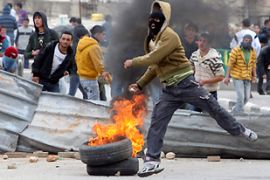Gazans wounded in Israeli strike
At least 11 people wounded during second night of Israeli strikes on Gaza Strip.

Al Jazeera’s Casey Kauffman, reporting from Gaza, said Israel called the strike a reaction to rocket fire from Gaza into southern Israel a day earlier.
“It’s the second night of attacks in the Gaza Strip,” he said.
“The Israelis say it is in retaliation for the rocket attack, but … the group that claimed responsibility for the attack [on Israel] says [the rocket attack] is in reaction to what’s perceived as [Israeli] aggression and provocation in the West Bank.”
Fierce clashes
The two days of strikes come amid the backdrop of clashes between Palestinian youths and Israeli police in the West Bank and East Jerusalem.
Palestinians on Friday fought running battles with Israeli police in the occupied West Bank city of Hebron, the latest clashes since Israel announced the construction of 1,600 new homesin East Jerusalem.
Israeli security forces used tear gas against hundreds of stone-throwing Palestinian protesters following Friday prayers in Hebron.
Al Jazeera’s Nour Odeh, reporting from Hebron, said heightened tensions throughout the past week have erupted into open confrontation.
“The situation has quietened down, but there were fierce clashes between Palestinian youth and Israeli soldiers,” she said.
“The amount of tear gas used in the city is just quite unbelievable and a dozen injuries have been reported in the occupied West Bank.”
There were similar altercations at Bilin and Nilin, sites of weekly Palestinian protests against Israel’s West Bank “security barrier”.
Hebron is home to about 160,000 Muslims, but some 500 Israelis and Jews live in a small settlement in the centre of the city, with a heavy Israeli security detail.
There were also skirmishes in East Jerusalem as Israeli police were also on high alert in Jerusalem where they prevented men under the age of 50 from entering the al-Aqsa mosque in the Old City.
Police spokesman Micky Rosenfeld said prayers at the compound passed without incident and Jerusalem was generally calm.
“A lot of people are angry at what is taking place in Hebron and are coming out to show solidarity,” Al Jazeera’s Sherine Tadros, reporting from Shuafat refugee camp in East Jerusalem, said.
“It is all of course mounting tension over what Palestinians here see as a restriction of their basic rights.”
Charged atmosphere
An already charged atmosphere intensified this week as a rebuilt 17th-century synagogue was opened in the Jewish quarter of the Old City, a few hundred metres from the compound.
Many Palestinians view Israeli projects near the mosque compound – a site holy both to Jews and Muslims – as an assault on its status quo or a prelude to the building of a third Jewish temple there.
Israel had sealed off the West Bank following previous clashes at the East Jerusalem site known to Muslims as the al-Aqsa mosque compound and to Jews as the Temple Mount.
Clashes at the same site in September 2000 triggered a wave of unrest in the Palestinian territories that became known as the “Second Intifada [uprising]”.
The latest violence had led some in the region to speak of the possibility of a “Third Intifada”.
Mohammed Dahlan, a senior Fatah official, said on Friday the party “does not seek a third intifada,” after continuing unrest in East Jerusalem and the West Bank.
But he also warned that the Palestinian people “have the right and the duty to defend themselves and the Islamic holy sites”.
The unrest comes as the international Quartet of Middle East peace mediators- an informal group including the United Nations, the European Union, the United States and Russia – called on Israel to freeze all settlement activity.
